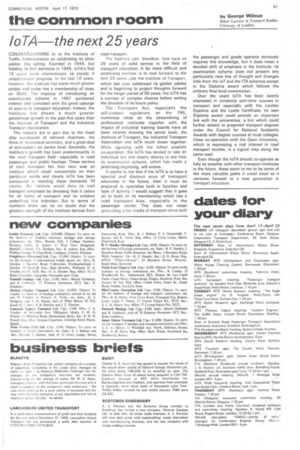loTA the next 25 years
Page 63

If you've noticed an error in this article please click here to report it so we can fix it.
CONGRATULATIONS to to the Institute of Traffic Administration on celebrating its silver jubilee this spring. Founded in 1944, but holding its first elections in 1945, loTA's first 15 years were characterized b steady if unspectacular progress. In the last 10 years, however, the Institute has made much greater strides and today has a membership of close on 3000. The impetus of introducing an examination scheme in 1967 quickened interest and coincided with the great upsurge of activity in transport education. Indeed, the Institute has shown a much greater percentage growth in the past five years than the Institute of Transport and the Industrial Transport Assoeiation.
The reasons are in part due to the most able succession of national chairmen, the drive of its national secretary, and a great deal of enthusiasm on centre level. Secondly, the Institute's growth has been predominantly in the road transport field--especially in road passenger and public haulage. These sectors of road transport felt that here was an institute which could concentrate on their particular needs and clearly loTA has been successful in meeting these demands. Of course, the Institute would deny its road transport emphasis by stressing that it caters for all forms of transport and its emblem underlines this intention. But in terms of numbers there can be no doubt that the greatest strength of the Institute derives from road transport.
The Institute can, therefore, look back on 25 years of solid service in the field of transport education. A far more difficult and perplexing exercise is to look forward to the next 25 years. Like the Institute of Transport, which last year celebrated its golden jubilee and is beginning to project thoughts forward for the longer period of 50 years, the loTA has a number of complex choices before setting the direction of its future policy.
The Transport Act, especially the
still-awaited regulations on the TM L, numerous ideas on the streamlining of professional institutes together with the impact, of industrial training boards have all been strands drawing the senior body, the , Institute of Transport, the Industrial Transport. Association and loTA much closer together. While agreeing with the fullest possible co-operation, the loTA has tended to take an individual line and clearly desires to see how its examination scheme, which has made a promising beginning, will evolve..
It seems to me that if the loTA is to have a special and distinct area of transport education in the future, then it must be prepared to specialize both in function and type of activity. I would suggest that it goes on to build on its membership which has a road transport bias, especially in the passenger sector. This does not mean precluding other media of transport since both
the passenger and goods-operator obviously requires this knowledge, but it does mean a decided shift of emphasis in the Institute. Its examination scheme does not present any particularly new line of thought and diverges little from the loT and the ITA schemes except in the Diploma award which follows the ordinary final level examination.
Over the years loTA has been keenly interested in university part-time courses in transport and especially with the London Diploma and the Leeds Certificate. Its own Diploma award could provide an important link with the universities, a link which could further extend to projected transport degrees under the Council for National Academic Awards with degree courses at local colleges. Close co-operation with the Open University, which is expressing a real interest in road transport studies, is a logical step along the same road.
Even though the loTA should co-operate as fully as possible with other transport institutes in the future, these seem to me to be some of the more valuable paths it could tread as it ventures forward to a new generation in transport education.












































































































